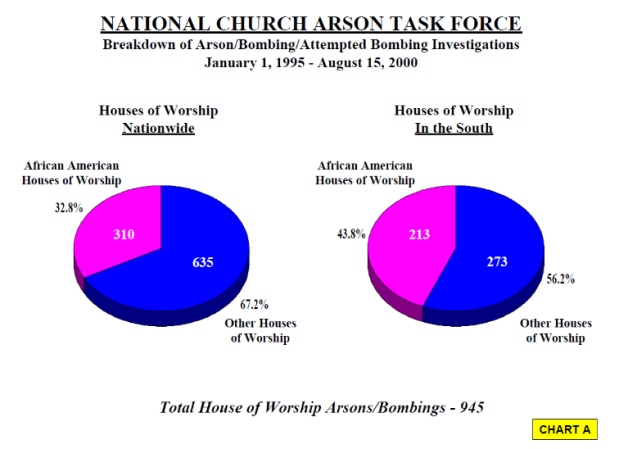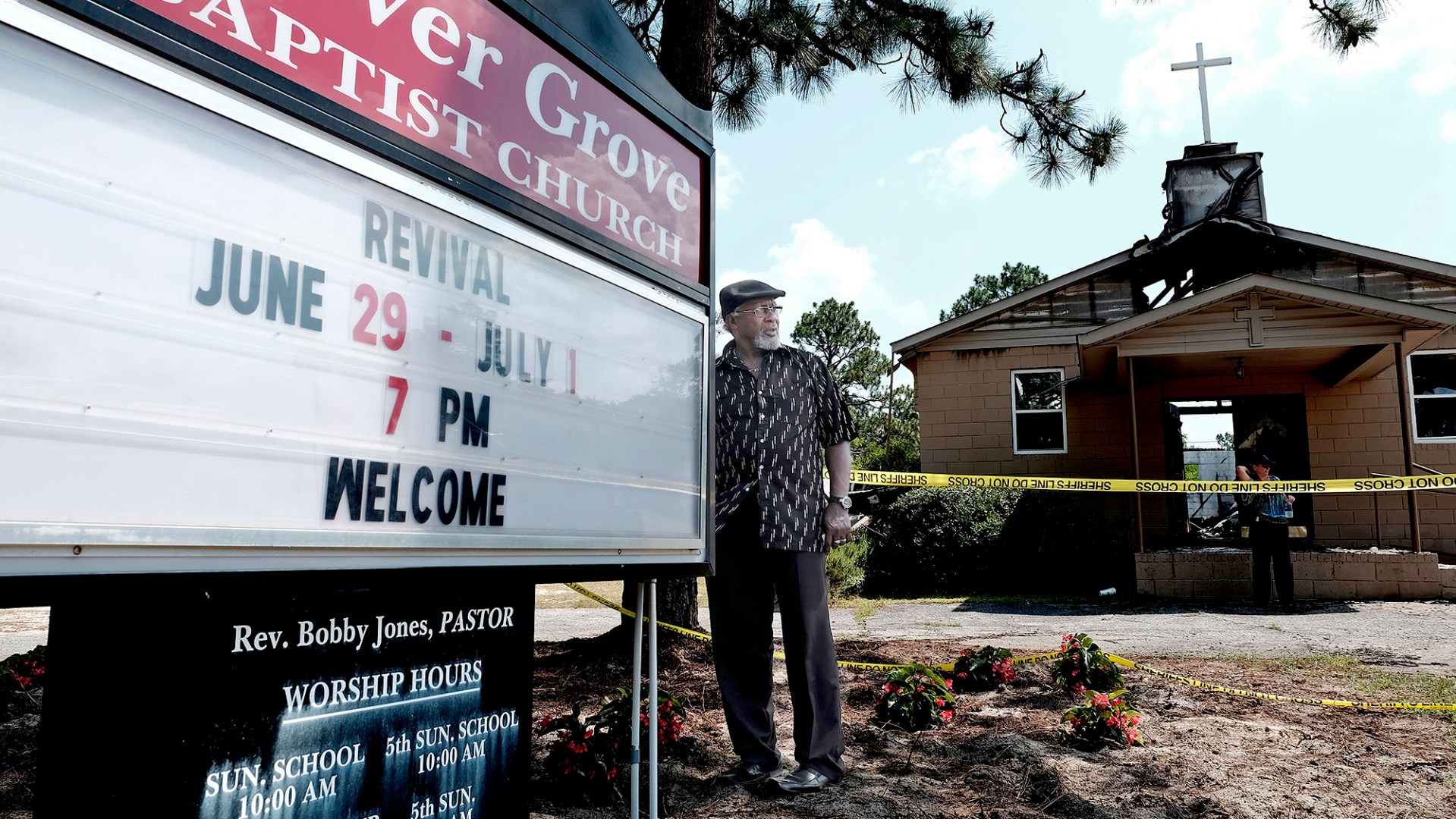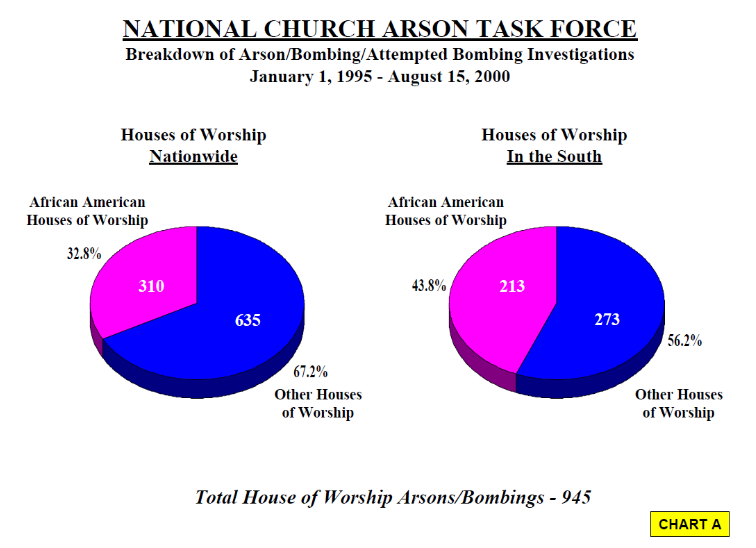Update (Oct. 21): A string of fires set at six predominantly African-American churches in nine days in St. Louis have sparked an arson investigation by the Bureau of Alcohol, Tobacco, Firearms, and Explosives (ATF), along with the St. Louis fire department and regional bomb and arson unit.
The churches are within a few miles of each other in predominantly African-American neighborhoods. No one was in the churches when the fires were set, and each was lit at an exterior door, according to investigators.
“We believe the fire-setting activity is meant to send a message,” the ATF said in a statement.
The numbers of churches fires has declined in the last 20 years, yet incidents of arson at churches remain surprisingly common. From 2010 to 2014, about three churches were set ablaze every two weeks, according to the Pew Research Center. Overall, half of the 4,705 churches fires in the last 20 years were arson.
The St. Louis churches in the recent spate of fires are of varying sizes and denominations: two Missionary Baptist, one Lutheran, one Church of Christ, one nondenominational, and one Catholic.
“Satan is BUSY, but MY God is GREATER!” posted New Northside Missionary Baptist Church on its Facebook page. “Someone tried to set our church on fire, but the ONLY fire that's burning is the fire we're having on the INSIDE! #Covered#GraceAndMercy”
At least one pastor of a burned church is ready to forgive whoever is responsible for the fire.
“The arsonist, he’s not my enemy,” David Triggs, pastor of New Life Missionary Baptist Church toldThe Washington Post. “I forgave him the moment I pulled up to the burning church. I believe he is spiritually sick, and that’s the way we have to address this — by setting our differences aside and praying together.”
—–
Update (July 2): The FBI believes that lightning, not arson, caused the fire at Mount Zion AME. "A forensics report of lightning strikes by CNN meteorologists shows four strikes occurred in the immediate vicinity of the church, all at 7:18 p.m. ET Tuesday," reports CNN.
So far, officials suspect lightning caused three of the recent fires at black churches.
—–
After news broke on Tuesday night about the seventh fire at a Southern black church since the Charleston massacre, one white pastor suggested that would-be arsonists expand their targets.
“Hey racists, come burn our church too,” tweeted Ray Ortlund, who leads Immanuel Church near Nashville. “We stand for Jesus too. We oppose racism too.”
Federal officials said they had not ruled anything out in their investigation of the blaze that destroyed that Mount Zion AME Church in Greeleyville, South Carolina, in a press conference on Wednesday morning. However, one federal official told the Associated Press that the cause was not arson.
The church had been the victim of arson by two KKK members in 1995, reportsThe Post and Courier, during a wave of 670 church burnings, bombings, and attempted bombings from January 1, 1995, to September 8, 1998.
It was rebuilt in 1996. President Clinton was among the guests at the dedication.
"I want to ask every citizen, as we stand on this hallowed ground together, to help to rebuild our churches, to restore hope, to show the forces of hatred they cannot win,” he said at the dedication.” I want to ask every citizen in America to say we are not going back, we are not slipping back to those dark days.”
The recent fires have led to fears that dark days are returning for black churches.
More than half a dozen black churches have burned since a gunmen opened fire at a Bible study at Charleston’s Emanuel AME, killing nine.
Earlier this week, investigators said there was no evidence that any of these burnings could be considered hate crimes, The New York Times reports. So far, at least two of the recent church fires—College Hill Seventh-day Adventist Church in Knoxville, Tennessee, and Briar Creek Baptist Church in Charlotte, North Carolina—have been classified as arson.
Black churches have a long history of being racist targets.
In February 2006, ten churches in southwest Alabama were destroyed or damaged over a span of two weeks. A wave of church fires—including many black churches—in 1996 led Congress to pass the Church Arson Prevention Act and President Clinton to open a related Justice Department task force.
By 2000, that task force had investigated 945 church fires, according to a report from the Department of Homeland Security, with more than 305 convictions in 224 arsons and bombings. The number of arson declined following a spike in the mid-1990s.

Joe Carter of the Southern Baptist Convention's Ethics and Religious Liberty Commission notes that:
• One-third of the incidents occurred at African-American places of worship.
• Forty-six of the 79 defendants (58 percent) convicted on federal charges related to arson or bombing were “motivated by bias.”
• 39 percent of the arsonists were between the ages of 6 to 17 (14 percent were 6 to 13, 25 percent were 14 to 17).
• Almost three-quarters (63 percent) of the arrestees were white males.
Those 1990s-era arsons also led to partnerships among diverse groups including the Christian Coalition, the National Council of Churches (NCC), the National Association of Evangelicals, and the National Black Evangelical Association, who raised financial support for the affected congregations.
“Whoever is responsible for the rash of black church arsons—whether conspirators or copycats—should be forewarned: what they intend as a blow to the heart of the African-American community may instead be a wakeup call to the church, both black and white,” wrote Richard A. Kauffman in a CT editorial.
The Institute on Religion and Democracy, however, questioned whether the arsons were racially motivated and accused the NCC of "creating a baseless hysteria and for using contributions for its own political agendas," according to Touchstone magazine.
A crowdfunding campaign to raise funds for the affected churches is being led by an Episcopal congregation in St. Louis. Most responses have come through condemnations of the attacks on social media, many using the hashtag #WhoIsBurningBlackChurches.
“Hypocrisy is when people who decry destruction of property during riots are silent when black churches burn,” tweeted CT columnist Peter Chin.
“Let all churches stand with our black brothers and sisters and support the rebuilding of every destroyed church,” tweeted Northern Seminary professor David Fitch.
“If you claim to love the global church, can you join us in asking #WhoIsBurningBlackChurches right here in America?” tweeted Austin Channing, Calvin College’s multicultural liaison.
“We will not let our faith be taken from us. We will overcome fear. Stand with us and care also about #WhoIsBurningBlackChurches,” tweeted Zakiya Naema Jackson, a board advisor for the Christian Community Development Association.
“Several Christian denominations were singing ‘racial kumbaya’ a few weeks ago, but are quiet about #WhoIsBurningBlackChurches,” tweeted Reformed African American Network author Ekemini Uwan.
“Black churches are burning again. No. 7 since #CharlestonShooting. This is why we talk about race so much,” tweeted The King’s College professor Anthony Bradley.
“This is so unbelievable but nevertheless, it is real. It's happening. Now. In our country.This is why we have to keep talking, preaching, advocating, singing about #BlackLivesMatter,” wrote Quest Church pastor Eugene Cho on his Facebook page.
“Please pray for our sisters and brothers. Pray for their church communities. Pray for their hearts and minds. Pray for their safety. Pray for their local communities to literally surround them in both fierce and tender protection and love. Pray for their leadership. Pray for the investigation. Pray for justice. Pray for repentance. And yes, we are bold enough to keep praying for reconciliation,” he added.
“The God Who Sees knows exactly who is burning Black churches,” tweeted Beth Moore. “With 1 unified voice let's ask Him to expose them at once & stop this madness.”
“Time for this to end!” tweeted ERLC president Russell Moore. “The burning of these black churches is a national problem, not just a series of local ones. I hope the FBI is on this.”
In the aftermath of South Carolina, white Christian leaders have the opportunity to “join forces with reconcilers and those standing against injustice to publicly denounce the violence against black bodies,” wrote Natasha Sistrunk Robinson at Missio Alliance.
“They are not silent on other issues where they have counted the cost and considered the breaches in the fabric of our nation and in the walls of the church,” she wrote. “Therefore, I am asking them to consider the fact that the very presence of racism, however subtle, is something we have all grown too comfortable with in our society and that itself is a violent act.”
On the whole, church fires are surprisingly common.
Fire departments responded to more than 1,700 fires on religious property each year between 2007 to 2011, according to a 2013 report by the National Fire Protection Agency. Just over one in seven fires (16%) was the result of arson, meaning there are five arsons in an average week.










